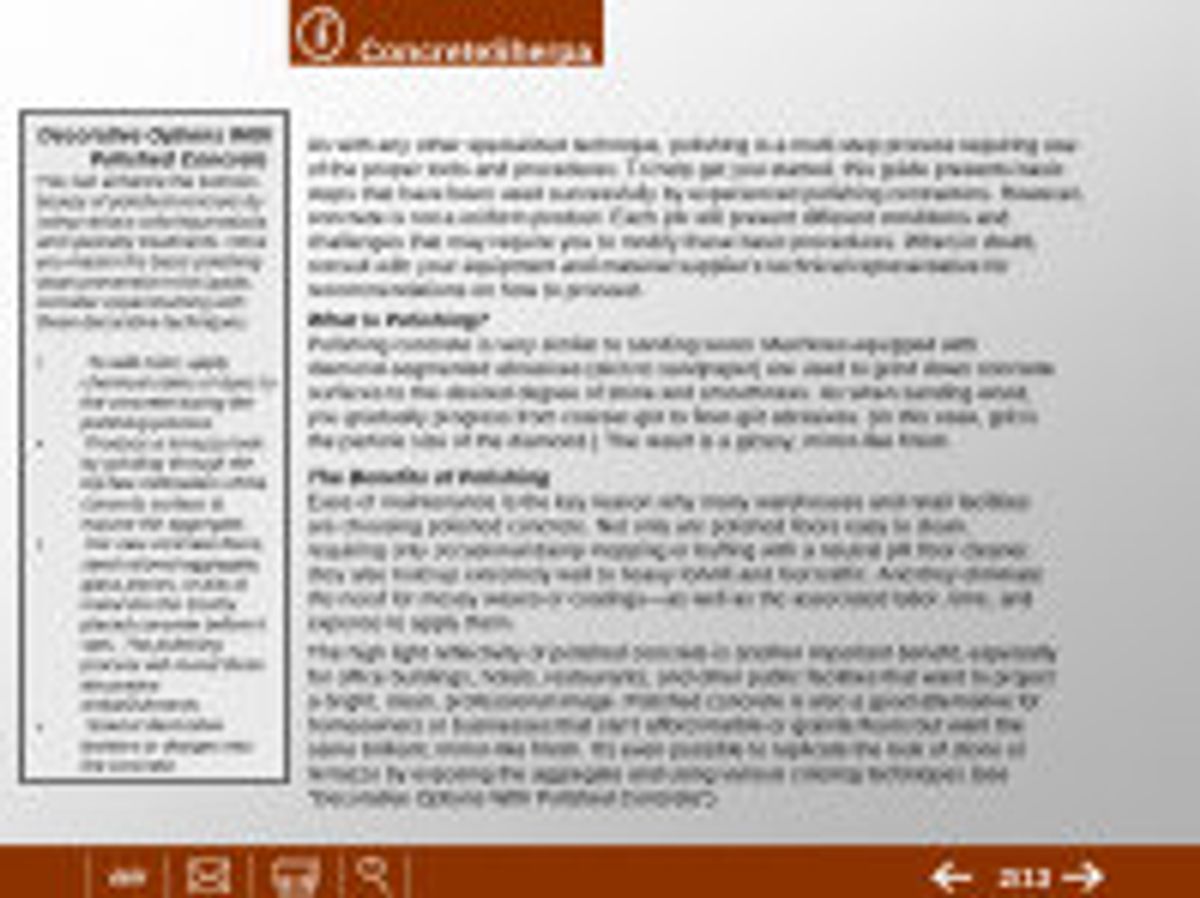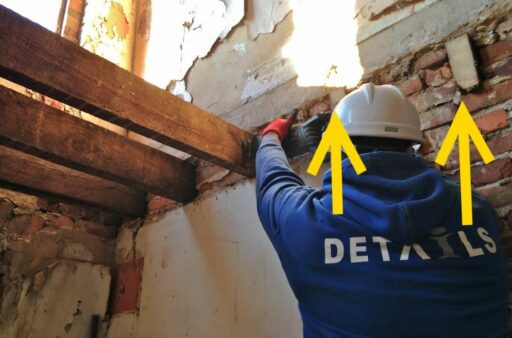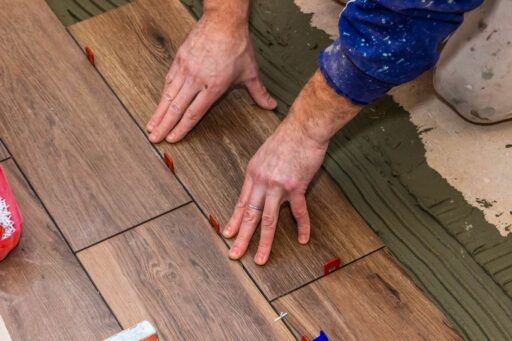Choosing the right large industrial floor polishing contractor is a crucial decision that can significantly impact the aesthetics, functionality, and longevity of your commercial flooring. With a myriad of options available, it’s essential to understand the various aspects of flooring and the expertise required to ensure a successful project. This article will guide you through the process of selecting a contractor who can deliver high-quality results that meet your industrial needs.
Key Takeaways
- Understanding the differences between polished concrete and other flooring materials is key to making an informed decision for your industrial space.
- Quality industrial flooring services hinge on contractors’ knowledge of surface preparation techniques and the variety of concrete polishing and coating options.
- The right contractor should have verifiable credentials, extensive experience, and a portfolio of past projects that demonstrate their ability to deliver high-quality work.
- Efficient and durable flooring installation requires the use of appropriate diamond tools for surface preparation and a commitment to maintenance programs for long-term care.
- Navigating the epoxy and polishing contractor landscape demands an understanding of the differences in services, technical support, and contractor specialization to make the best choice for your project.
Understanding Your Flooring Options

Commercial Flooring Basics
When considering commercial flooring, it’s essential to recognize the variety of options available that cater to different industrial needs. Industrial flooring is designed to withstand the rigorous demands of heavy machinery, high foot traffic, and potential chemical spills. It includes specialized systems such as non-slip installations, organic acid and caustic-resistant systems, and thermal shock resistant flooring, like urethane cement.
The benefits of choosing the right commercial flooring extend beyond durability. Eco-friendliness, low maintenance, and visual appeal are also key factors. For instance, many flooring options are LEED compliant, contributing to sustainable construction, and offer a range of aesthetic choices from matte to high gloss finishes.
The versatility of commercial flooring allows for customization to enhance both function and aesthetics. You can align the flooring with your company’s brand or create a visually pleasing environment without compromising on practicality.
Furthermore, the installation process of commercial flooring is often streamlined, with materials like large, continuous pieces that reduce seams and expedite the setup. This efficiency is crucial in minimizing downtime in industrial settings. Maintenance programs ensure long-term care, preserving the floor’s integrity and appearance over time.
Comparing Polished Concrete and Other Materials
When considering flooring options for industrial spaces, polished concrete stands out for its durability and low maintenance. Unlike other materials that may require frequent replacement or intensive care, polished concrete offers a long-lasting solution with minimal upkeep. Its cost-effectiveness is evident in the long run, despite a potentially higher initial investment.
Polished concrete’s aesthetic versatility allows it to be stained or dyed to match any decor, making it a suitable choice for various settings.
Here’s a quick comparison of polished concrete with other common flooring materials:
- Vinyl: Less durable, prone to damage, but initially cheaper.
- Tile: Offers various designs, but can be brittle and require more maintenance.
- Carpet: Provides warmth and noise reduction, yet demands regular cleaning and is less durable.
- Epoxy: Highly resistant to chemicals, but may yellow over time and is less environmentally friendly.
Selecting the right flooring material involves balancing aesthetics, practicality, and long-term cost implications. Polished concrete, with its blend of functionality and style, often emerges as the preferred choice for industrial environments.
Evaluating Aesthetics and Practicality
When choosing the right large industrial floor polishing contractor, it’s essential to strike a balance between aesthetics and practicality. The visual appeal of your floor can significantly impact the overall ambiance of your space, but it should not come at the expense of functionality and durability. Here are some key considerations:
- Durability: Opt for floors that can withstand heavy industrial use without compromising on style.
- Eco-Friendliness: Seek out flooring solutions that contribute positively to the environment.
- Low Maintenance: Ensure that the flooring is easy to clean and maintain, saving time and resources.
- Visual Appeal: Explore the range of finishes, from matte to high gloss, to find one that aligns with your aesthetic goals.
- Cost-Effectiveness: Consider the long-term savings offered by durable and low-maintenance flooring options.
The right flooring should enhance the space’s functionality while reflecting the desired aesthetic. It’s not just about the immediate look; it’s about selecting a floor that will remain appealing and practical for years to come.
Remember that the choice of flooring can also influence operational costs. For instance, certain polished concrete finishes can help reduce lighting needs by reflecting more light, thereby lowering energy expenses. Aesthetic versatility is another advantage, with a wide range of finishes and the possibility of staining or dyeing to match any decor. This versatility ensures that your industrial space can maintain a contemporary or traditional look, depending on your preference.
Identifying Quality Industrial Flooring Services

Surface Preparation Techniques
Surface preparation is a pivotal step in the flooring installation process, as it ensures a solid, level base which is essential for the durability and aesthetics of the final finish. Professional surface preparation tools are indispensable for achieving a smooth, even base that enhances the longevity and appearance of the flooring.
Surface preparation tools facilitate precision, reduce work time, and significantly improve the quality of the project.
When selecting surface preparation tools, consider the specific requirements of your project. Factors such as the type of surface, the scale of the task, and the desired finish should guide your choice. Here’s a list of steps typically involved in surface preparation:
- Thorough cleaning of the existing floor
- Repairing any cracks or uneven areas
- Roughening the surface to ensure a strong bond with coatings
- Applying a primer to enhance adhesion
For optimal results, it’s crucial to choose tools that are engineered for durability and precision. This ensures that your surfaces are perfectly prepped for any finish, whether it’s for residential renovation or commercial construction.
Concrete Polishing and Coating Varieties
When selecting a concrete polishing or coating for your industrial floor, the variety of options can be overwhelming. Understanding the specific needs of your environment is crucial to choosing the right solution. For instance, areas with heavy machinery may require non-slip flooring installation, while spaces that handle organic acids would benefit from caustic-resistant systems.
The process of concrete polishing involves several steps to achieve a durable and aesthetically pleasing surface. It starts with surface evaluation and repairs, followed by grinding with diamond segments, densifying with a chemical hardener, and finally, polishing to the desired shine. Sealing the floor enhances its appearance and longevity.
Contractors must tailor their approach to each project, considering factors like the floor’s exposure to thermal shock or the need for electrostatic dissipating properties.
Epoxy flooring is another popular choice, known for its durability and ease of maintenance. It comes in various types, including standard epoxy, epoxy cove base, and specialized coatings like anti-microbial or thermal shock resistant urethane cement. The selection of diamond tools for grinding and polishing is guided by the project specifics and desired finish.
Here’s a list of some common services offered by contractors:
- Concrete polishing
- Epoxy flooring
- Non-slip flooring installation
- Organic acid and caustic-resistant systems
- Thermal shock resistant flooring (Urethane cement)
- Decorative inlays
- Floor markings and line striping
- Maintenance programs
Assessing Contractors’ Equipment and Expertise
When selecting a contractor for large industrial floor polishing, it’s crucial to assess the equipment and expertise they bring to the project. The equipment needed for polishing concrete can vary from job to job, but there are some essentials that should be present for any sizable task. A contractor’s inventory should include items such as masonry saws, concrete and mortar mixers, surface preparation tools, and walk-behind concrete saws.
The right equipment ensures not only the quality of the finish but also the efficiency and safety of the installation process.
Additionally, the expertise of the contractor is just as important as their tools. Pioneering approaches and evolving methodologies are indicative of a contractor’s ability to adapt and deliver high-quality results. It’s beneficial to evaluate their skill levels, abilities, and the testimonials from past projects to gauge their proficiency.
Here is a list of essential equipment that a reputable contractor should have:
- Core Drills
- Concrete Floor Grinders
- Walk Behind Saws
- Dust and Slurry Management Systems
- Personal Protective Equipment (PPE)
Choosing a contractor with the right combination of advanced equipment and proven expertise will ensure that your industrial flooring project is completed to the highest standards.
Selecting the Right Contractor for Your Project

Verifying Credentials and Experience
When selecting a large industrial floor polishing contractor, verifying their credentials and experience is paramount. A contractor’s history can reveal their commitment to quality and their ability to deliver consistent results. Look for companies that are self-performing their services, as this often indicates a higher level of control over training and quality checks.
It’s also beneficial to choose contractors who are actively involved in supporting sustainability objectives. This not only aligns with green initiatives but also suggests a forward-thinking approach to resource management.
Consider the following checklist when evaluating a contractor’s credentials:
- Longevity in the business (e.g., over 30 years of experience)
- Ownership structure (e.g., woman-owned company)
- Range of services offered across different sectors
- Commitment to employee well-being and community support
By ensuring that the contractor has a robust track record and a comprehensive approach to service delivery, you can anticipate a higher standard of workmanship and reliability.
Understanding the Importance of Proper Tool Selection
Selecting the right tools for surface preparation and polishing is a critical step in ensuring the success of an industrial flooring project. Abrasives are the most important tool for mechanically processing concrete to a polished finish. They come in various forms, shapes, and sizes, tailored to meet the specific needs of each project.
When choosing surface preparation tools, it’s essential to consider the type of surface, the scale of the task, and the desired finish. For instance, metal-bonded diamonds are ideal for heavy coating removal and leveling uneven surfaces, while resin-bonded diamonds are more versatile, suitable for polishing to achieve a smoother finish.
The right selection of tools not only facilitates precision but also reduces work time and significantly improves the quality of the final flooring.
Understanding the different grit standards is also crucial. Starting with a lower grit for aggressive removal and moving onto higher grits for polishing can lead to a perfect grind with less effort. Here’s a quick guide to help you choose:
- Metal-bonded Diamonds: Heavy coating removal, leveling uneven surfaces.
- Resin-bonded Diamonds: Polishing, smoother finish.
- Grit Standards: Different grits for specific tasks.
Evaluating Past Projects and Client Testimonials
When selecting a contractor for industrial floor polishing, reviewing past projects and client testimonials is crucial. This provides insight into the contractor’s ability to deliver quality work and meet client expectations. A contractor’s portfolio can showcase their expertise and the variety of projects they have successfully completed.
- Experience: Look for a diverse range of projects that demonstrate the contractor’s versatility.
- Quality: High-resolution before-and-after photos can reveal the attention to detail and finish quality.
- Reliability: Testimonials and reviews can indicate the contractor’s punctuality and adherence to budget.
- Communication: Client feedback often reflects the contractor’s communication skills throughout the project.
It’s essential to conduct thorough research and due diligence when evaluating a contractor. Ask detailed questions about their experience, communication, quality of work, and adherence to budget. Verify licenses and past work for reliability.
Lastly, consider the contractor’s commitment to the industry. Longevity in business, such as having 25 years of experience, can be a testament to their dedication and expertise. Always ensure that the contractor you choose has a proven track record of delivering exceptional results.
Ensuring Efficient and Durable Flooring Installation

The Role of Diamond Tools in Surface Preparation
When it comes to preparing industrial floors for polishing, diamond tooling is critical in achieving superior results. The selection of diamond tools is pivotal, as different types of diamond bonds and grits are designed for various stages of the surface preparation process.
- Metal-bonded diamonds are typically used for heavy coating removal and leveling uneven surfaces.
- Resin-bonded diamonds, on the other hand, are more versatile and can be used for polishing to achieve a smoother finish.
It’s essential to start with a lower grit for aggressive material removal and then progress to higher grits for a polished surface. This stepwise approach ensures that the floor is adequately prepared for the final finish, enhancing both its durability and aesthetics.
The right selection and application of diamond tools can significantly reduce work time and improve the quality of the flooring project. Understanding the specific needs of your floor and the capabilities of your tools is crucial for efficiency and effectiveness in surface preparation.
Maintenance Programs and Long-Term Care
Selecting the right industrial floor polishing contractor involves more than just the initial installation. Long-term care and maintenance are crucial for ensuring the longevity and performance of your flooring. Maintenance programs tailored to your specific flooring system can prevent premature wear and extend the life of your investment.
A well-structured maintenance program not only preserves the floor’s appearance but also enhances safety and operational efficiency. Regular upkeep, such as non-slip treatments and resistance checks against organic acids, caustics, and thermal shock, are essential components of a comprehensive care plan.
Here is a list of common maintenance services offered by contractors:
- Non-slip flooring treatments
- Organic acid and caustic-resistant systems
- Thermal shock resistant flooring solutions
- Regular cleaning and degreasing
By incorporating these services into a regular maintenance schedule, you can ensure that your industrial flooring remains in top condition, supporting a safe and productive work environment.
Choosing Flooring That Withstands Industrial Demands
Selecting the right flooring for industrial environments is crucial for ensuring longevity and safety. Industrial floors must be tough and durable to resist the daily wear and tear of heavy machinery and high traffic. It’s important to consider flooring that can withstand the harsh conditions often found in industrial settings, such as exposure to extreme temperatures, chemicals, and organic acids.
When evaluating options, prioritize materials known for their resilience and ability to maintain productivity without frequent repairs. This not only ensures a safe working environment but also aligns with regulatory compliance, such as FDA or USDA standards for food processing plants.
The following list highlights key features to look for in industrial flooring:
- Non-slip surfaces to enhance safety
- Resistance to organic acids and caustics
- Thermal shock resistant systems, like urethane cement
- Maintenance programs that support long-term care and durability
While the initial investment in high-quality industrial flooring might be higher, the benefits of reduced maintenance and longevity cannot be overlooked. Flooring solutions that are built to last will ultimately provide a more cost-effective outcome for industrial facilities.
Navigating the Epoxy and Polishing Contractor Landscape

Differentiating Between Epoxy and Polishing Services
When selecting a contractor for industrial flooring, it’s crucial to understand the differences between epoxy and polishing services. Epoxy contractors specialize in the application of resin-based coatings, which provide a durable and chemical-resistant surface. These contractors are adept at handling various types of coatings and are familiar with the intricacies of epoxy preparation and application.
On the other hand, contractors offering polishing services focus on mechanically enhancing the concrete’s surface to a high gloss finish. This process involves grinding the concrete with diamond tools to achieve the desired level of shine and smoothness. Polishing can enhance the natural beauty of concrete while providing a low-maintenance and long-lasting floor.
- Epoxy Services:
- Durable coatings
- Chemical resistance
- Specialized in resin-based applications
- Polishing Services:
- High gloss finish
- Mechanical surface enhancement
- Natural aesthetics and durability
Choosing the right service depends on the specific needs of your facility, the expected traffic, and the environmental conditions it will face. It’s essential to match the service to the functional requirements and aesthetic goals of your space.
The Significance of Technical Support and Resources
When selecting a large industrial floor polishing contractor, the availability and quality of technical support and resources are crucial. Contractors with robust support systems can provide immediate assistance and guidance, ensuring that any issues are resolved promptly and effectively. This support extends beyond the installation phase, offering long-term benefits for maintenance and troubleshooting.
- Support & Training: Access to comprehensive training materials and support staff can significantly impact the success of your flooring project.
- Product Manuals and Safety Data Sheets: These documents are essential for understanding the products used and ensuring safe application methods.
- Customer Support Lines: A dedicated support line for immediate assistance can be invaluable during critical moments.
Choosing a contractor with a strong emphasis on technical support not only facilitates a smoother installation process but also contributes to the longevity and performance of the flooring system.
Making Informed Decisions Based on Contractor Specialization
When selecting a contractor for your industrial floor polishing needs, it’s crucial to consider the specialization of the company. Contractors with a niche in either epoxy flooring or concrete polishing bring a depth of knowledge and experience that can significantly impact the outcome of your project.
- Epoxy contractors often excel in creating durable, stylish surfaces ideal for high-traffic areas like businesses and restaurants.
- Concrete polishing specialists, on the other hand, are adept at producing high-gloss finishes that are both aesthetically pleasing and practical for industrial environments.
The more specifically you can tailor your toolkit to the project, the more efficient you’ll be – with better results!
Understanding the tools and techniques each contractor is proficient in can guide your decision. For instance, the choice between metal-bonded and resin-bonded diamonds is dictated by the specifics of your project, such as the type of coating and the desired finish. A contractor’s ability to measure concrete hardness and select the appropriate bond and grit is essential for optimal grinding results and project efficiency.
Conclusion
Selecting the right large industrial floor polishing contractor is crucial for achieving the desired finish and longevity of your flooring. It requires a careful balance between aesthetic appeal and practical functionality. From understanding the importance of surface preparation and the role of diamond tools in grinding concrete to recognizing the variety of services offered by contractors, such as concrete polishing, epoxy flooring, and maintenance programs, the decision-making process is complex. Remember to consider the contractor’s expertise, the quality of their equipment, and their ability to meet the specific needs of your project. With the right knowledge and resources, you can ensure that your industrial flooring not only looks impressive but also stands the test of time. For further assistance or to explore your options, don’t hesitate to reach out to experienced professionals in the field.
Frequently Asked Questions
What are the key factors to consider when choosing a flooring option for a commercial space?
When choosing flooring for a commercial space, consider both aesthetic and practical needs. Factors include durability, maintenance requirements, safety features, and how well the flooring complements the space’s purpose and design.
How do I determine the best concrete polishing or epoxy flooring contractor?
To determine the best contractor, assess their experience, credentials, equipment, and expertise. Look for a history of successful projects, positive client testimonials, and a portfolio that demonstrates their capability to deliver quality work.
What is the importance of surface preparation in flooring installation?
Surface preparation is crucial for ensuring the flooring adheres properly and lasts longer. It involves grinding and smoothing the concrete to create an ideal surface for coating or polishing, which affects the overall quality and durability of the flooring.
What role do diamond tools play in surface preparation?
Diamond tools are essential for efficient and precise surface preparation. They come in various types, such as metal-bonded for tough coatings and resin-bonded for polishing, and are chosen based on the project’s specifics and desired finish.
How can I ensure my industrial flooring will withstand the demands of my business?
Choose a flooring option designed for industrial use, with features like high durability, resistance to wear and chemicals, and non-slip surfaces. Ensure proper installation and commit to a regular maintenance program to prolong the floor’s lifespan.
What’s the difference between epoxy and concrete polishing services?
Epoxy services involve applying a resin-based coating to the floor for a durable, seamless finish, often with anti-microbial and chemical-resistant properties. Concrete polishing grinds and polishes the surface to a smooth, high-gloss finish without additional coatings.





